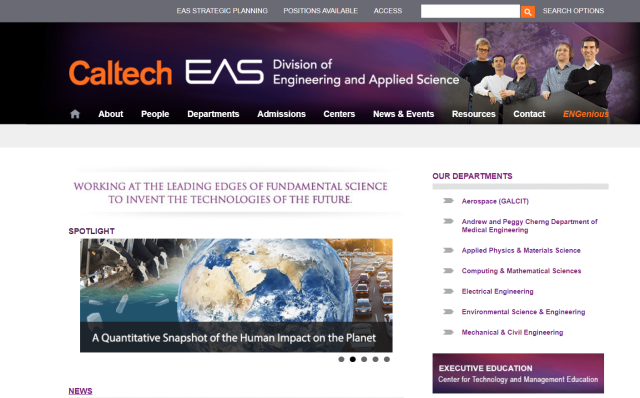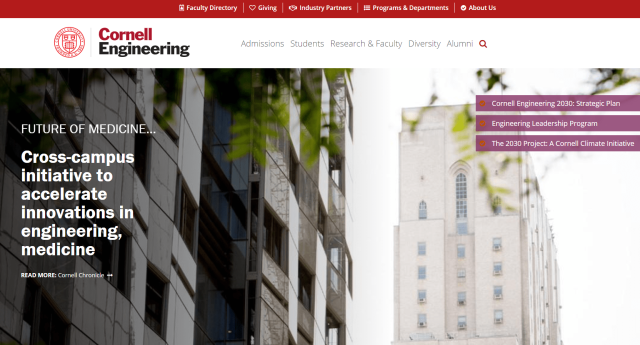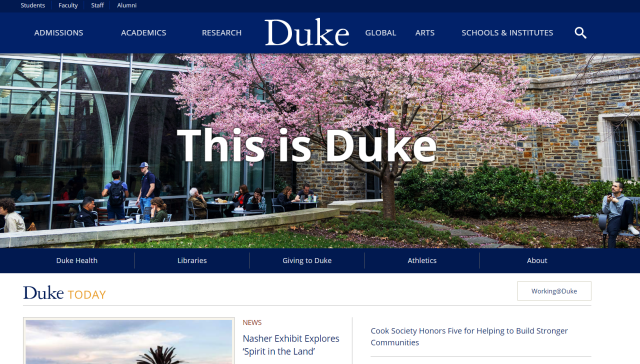Engineering is a fascinating field. You get to make a difference in people’s lives by creating and constructing structures and technology.
You can innovate and shape the future. All of this, however, is only achievable if you hold an engineering degree from a reputable university.
There might be many questions in your mind like Where can I pursue an engineering education? Which are the best Engineering schools in the USA? And likewise.
So considering that, I researched the various universities in the US that are providing quality education in engineering.
Here is a list of the best engineering colleges in the United States to help you make the best decision.
Top 9 Engineering Schools In The US: In A Nutshell (2024)
Following is a list of the leading nine best engineering schools in the United States.
Remember that selecting a school may not be sufficient. They must still grant your admittance. So begin your application processes early and apply to multiple schools.
| Sr. No | Best Engineering Schools in the US | Acceptance Rate | Location |
| 1. | Stanford University | 5% | Stanford, CA |
| 2. | Harvard University | 5% | Cambridge, MA |
| 3. | Massachusetts Institute of Technology | 7% | Cambridge, MA |
| 4. | Georgia Institute of Technology | 21% | Atlanta, GA |
| 5. | California Institute of Technology | 7% | Berkeley, CA |
| 6. | Princeton University | 6% | Princeton, NJ |
| 7. | Purdue University | 60% | West Lafayette, IN |
| 8. | Cornell University | 11% | Ithaca, NY |
| 9. | Duke University | 6% | Durham, NC |
1. Stanford University
Stanford University is one of the best universities for engineering which is located in Stanford, California.
It has been a leader in innovation because of its comprehensive research programs and various pivotal technologies that have transformed complete information technology.
It has a great faculty number of all experts in its specialization area. They conduct interdisciplinary research and that helps students to get technical excellence and creativity.

Furthermore, Stanford university provides various programs that help students to upskill their entrepreneurial skills and cultural awareness.
It has an enrollment of more than 3000 students every year. The student-faculty ratio is 2:1 and the application fee is $90.
The median salary offered after the complete degree program is $94,000/year.
| Location | Stanford, CA |
| Annual enrollment | 3,241 |
| Graduate acceptance rate | 13% |
| Undergraduate acceptance rate | 5 % |
| Graduate Fees (in-state/Out of state) | $49617/$49617 |
| Undergraduate Fees (in-state/ out of state) | $51000/$51000 |
Specializations:
- Astronautics and Aeronautics
- Bioengineering
- Chemical Engineering
- Environmental and Civil Engineering
- Computer Science
- Electrical Engineering
- Management Science and Engineering
- Materials science Engineering
- Mechanical Engineering
Rating: 4.9/5
2. Harvard University
Harvard is a prestigious private institution in Cambridge, Massachusetts, in the Boston metropolitan area. It is a medium-sized college with a total enrollment of 5,699 undergraduates.
They are a diverse group of motivated critical thinkers who hold themselves – and each other – to the finest professional and academic values.
The best thing about Harvard University is that they have a top-notch team of researchers and teaching staff who help students develop a creative mindset and innovative thinking.

Along with the best faculty team, it has a huge center for research and innovation. They also have various secondary programs available so that students can get a degree in major as well as minor subjects.
With the student-faculty ratio of 3:1, Harvard students excel in their skills with new innovations. The application fee is $75. The average salary students get after they complete the degree program is $89,700 per annum.
| Location | Cambridge, MA |
| Annual enrollment | 1,123 |
| Graduate acceptance rate | 9% |
| Undergraduate acceptance rate | 4 % |
| Graduate Fees (in-state/Out of state) | $48949/$49000 |
| Undergraduate Fees (in-state/ out of state) | $50000/$56000 |
Specializations:
- Applied Computation.
- Bioengineering.
- Electrical Engineering.
- Environmental Science and Engineering.
- Materials Science and Mechanical Engineering.
- Quantum Science and Engineering.
Rating: 4.9/5
3. Massachusetts Institute of Technology
Massachusetts Institute of Technology i.e, MIT is a well-renowned private college. It completely works on educating the next generation of engineering leaders to create new technology that serves society.
MIT’s School of engineering combines about 70% of undergraduate majors and 45% of graduate individuals. Graduate students have 15 areas of specialization in which they can take a degree.
It has more than 15 research centers on the campus itself such as ocean engineering, nanotechnologies center, cancer research, incubation center, etc.
Admissions at MIT are quite competitive as its acceptance rate is only 7%. Along with a good GPA, you need a good score in competitive exams like SAT and ACT.

The application fee is $75 and the student-faculty ratio is 5.6:1. It is the country’s well-known STEM institute which has the 6 largest schools featuring 8 various departments and 350+ faculty members.
The best part about MIT is, they provide comprehensive research programs that help students to team up with experts and faculty to perform innovation programs.
The median salary offered after the complete degree program is $104,700/year.
| Location | Cambridge, MA |
| Annual enrollment | 4,281 |
| Graduate acceptance rate | 12% |
| Undergraduation acceptance rate | 7 % |
| Graduate Fees (in-state/Out of state) | $49892/$50000 |
| Undergraduate Fees (in-state/ out of state) | $49000/$49000 |
Specializations:
- Astronautics and Aeronautics.
- Biological Engineering.
- Chemical Engineering.
- Environmental and Civil Engineering.
- Electrical Engineering and Computer Science.
- Medical Engineering and Science.
- Materials science Engineering
- Mechanical Engineering
- Nuclear Science and Engineering
Rating: 4.8/5
4. Georgia Institute of Technology
The College of Engineering at Georgia Tech is one of the largest universities in the country, with more than 50% of all undergraduates completing an engineering degree.
Applicants at Georgia Tech’s College of Engineering have a broad range of academic options. There are nearly 20 specialization options, ranging from medical physics to aeronautical engineering.
The industrial engineering and bioengineering courses at Tech Engineering are among the most highly esteemed.

A majority of their degrees also have dual offerings with colleges in other countries. You could complete your education while studying at associate overseas universities.
Along with a good GPA score you need to maintain the score in competitive exams like the ACT and SAT. The student-faculty ratio is 12:1 and the application fee is $75.
The average salary offered to degree students is $70,100 per year.
| Location | Atlanta, GA |
| Annual enrollment | 4,565 |
| Graduate acceptance rate | 33% |
| Undergraduate acceptance rate | 20 % |
| Graduate Fees (in-state/Out of state) | $13000/$33000 |
| Undergraduate Fees (in-state/ out of state) | $15798/$42190 |
Specializations:
- Aerospace Engineering
- Biomedical Engineering
- Chemical and Biomolecular Engineering
- Environmental and Civil Engineering
- Electrical and Computer Engineering
- Industrial and Systems Engineering
- Materials science Engineering
- Mechanical Engineering
Rating: 4.6/5
5. California Institute of Technology
The challenging curriculum, close engagement with experts, and small class sizes differentiate a Caltech education.
Caltech students pursue graduate and undergraduate degrees beside their intellectual partners in an academic context that promotes a multidisciplinary approach, analytical reasoning, mutual assistance, and a thorough knowledge of fundamental principles and concepts across disciplines.
Graduates are well prepared to recognize, evaluate, and solve tough issues within and throughout science and engineering disciplines, and they are required to apply and express their skills extensively throughout their professional careers.

People can enroll in around 40 research centers and departments within the College of Engineering.
All university graduates must additionally finish two minors, which can be in subjects other than engineering.
You must submit a $75 application fee to apply, and the student-faculty ratio is 2:1.
The typical salary awarded to students upon completion of their degree course is $85,900 per year.
| Location | Berkeley, CA |
| Annual enrollment | 3,397 |
| Graduate acceptance rate | 27% |
| Undergraduate acceptance rate | 12 % |
| Graduate Fees (in-state/Out of state) | $14632/$42646 |
| Undergraduate Fees (in-state/out-of-state) | $17000/$33000 |
Specializations:
- Aerospace.
- Medical Engineering.
- Applied Physics and Materials science.
- Computing and mathematical sciences.
- Electrical Engineering.
- Environmental Science and Engineering.
- Mechanical and Civil Engineering.
Rating: 4.5/5
6. Princeton University
Princeton is a small university with an enrollment of around 5,000 students per year. It is one of the five Ivy League colleges of engineering.
It allows students to choose the interdisciplinary focus rather than the STEM approach which helps them to develop strong entrepreneurship skills and public and liberal arts along with their engineering studies.

Along with the expert faculty, they have huge research centers for every department. The Princeton faculty members collaborate with international colleagues for research and innovation events. This helps students to gain innovation skills and also entrepreneurial skills.
The student-faculty ratio is 4:1. The application fee is $70. Also, the formal earnings after the 6 years of graduation is $74,700 per year.
| Location | Princeton, NJ |
| Annual enrollment | 5,321 |
| Graduate acceptance rate | 13% |
| Undergraduate acceptance rate | 6 % |
| Graduate Fees (in-state/Out of state) | $47140/$48000 |
| Undergraduate Fees (in-state/ out of state) | $46000/$46000 |
Specializations:
- Environmental and Civil Engineering.
- Computer Science.
- Chemical and Biological Engineering.
- Electrical and Computer Engineering.
- Operations research and Financial Engineering.
- Mechanical and Aerospace Engineering.
Rating: 4.5/5
7. Purdue University
Purdue, one of the country’s largest engineering schools, emphasizes providing students with hands-on expertise.
Students participate in the co-op program, which combines full-time work with conventional coursework, and the Engineering Projects in Community Outreach program, which places candidates in regional (and global) groups to engage on environmental and community concerns.
Purdue has 27 astronauts among its aerospace alumni, including Neil Armstrong, the very first person to walk on the moon, and Gene Cernan, the most famous astronaut.

Purdue university gives various opportunities in the research area and innovations in engineering faculty.
Along with the 390 full-time faculty, it has a faculty ratio of 5.8:1. The application fee is $75. And the median salary for graduates of $68,100.
| Location | West Lafayette, IN |
| Annual enrollment | 3,602 |
| Graduate acceptance rate | 29% |
| Undergraduate acceptance rate | 47 % |
| Graduate Fees (in-state/Out of state) | $12042/$30844 |
| Undergraduate Fees (in-state/out-of-state) | $12000/$30000 |
Specializations:
- Astronautics and Aeronautics.
- Biomedical Engineering.
- Civil Engineering.
- Materials Engineering.
- Agricultural and Biological Engineering.
- Nuclear Engineering.
- Chemical Engineering.
- Multidisciplinary Engineering.
- Environmental and Ecological Engineering.
- Computer and Electrical Engineering
- Industrial Engineering.
- Mechanical Engineering.
Rating: 4.6/5
8. Cornell University
Cornell Engineering and Cornell Engineers have made significant progress in the 150 years since. It is a large institute that provides a diverse range of technical and research programs.
Cornell Engineering’s academic leadership is proven by its present portfolio of world-class teaching staff and researchers, as well as its numerous centers and facilities.
Cornell engineers are also developing devices that selectively remove dangerous greenhouse gases from the air and leverage big data for powerful decision and machine understanding.

Cornell has over 100 interdisciplinary centers, institutions, laboratories, and programs that support both research and education.
Along with the application fee of $80 you need to score well in ACT or SAT exams that meet the requirement of the university.
The student-faculty ratio is 8:1 and the median salary offered to the candidate with a complete degree is $77,200 per year.
| Location | Ithaca, NY |
| Annual enrollment | 3,162 |
| Graduate acceptance rate | 28% |
| Undergraduate acceptance rate | 12 % |
| Graduate Fees (in-state/Out of state) | $52853/$52853 |
| Undergraduate Fees (in-state/out-of-state) | $31000/$31000 |
Specializations:
- Applied Engineering Physics.
- Biological Environmental Engineering.
- Biomedical Engineering.
- Chemical and Biomolecular Engineering.
- Environmental and Civil Engineering.
- Electrical and Computer Engineering.
- Engineering Management.
- Mechanical and Aerospace Engineering.
- Materials science Engineering.
- Operations Research and Information Engineering.
- Systems Engineering.
Rating: 4.4/5
9. Duke University
Duke University is one of the best engineering schools in the US that offers plenty of engineering specializations for you to pursue. The highest degree type in this university is Doctor’s degree.
It is a private non-profit university that has a large student population compared to other universities listed here. According to EduRank, it ranks in the #22 spot among the best colleges in the world, making it one of the best universities to study at.
There are four types of engineering degrees available at Duke, such as Bachelor’s degree, Graduate certificates, Master’s degree, and Doctorate degree.

Duke also has ethnically diversified students for engineering degrees, which includes Hispanic, Asian, African American, White, and other races.
The average GPA required to get into Duke is 4.13. The average SAT score you must score to get accepted at Duke is 1510, and the average ACT score is 34.
The average salary offered to engineering degree students is $70k per year at Duke University.
| Location | Durham, NC |
| Annual Enrollment | 6,883 |
| Graduate acceptance rate | 5.8% |
| Undergraduate acceptance rate | 6% |
| Graduate Fees (in-state/out-of-state) | $57900/$57900 |
| Undergraduate Fees (in-state/out-of-state) | $55880/$55880 |
Specializations:
- Mechanical Engineering
- Biomedical Engineering
- Civil Engineering
- Materials Engineering
- Electrical Engineering
- Computer Engineering
- Aeronautical & Aerospace Engineering
- Environmental Engineering
- General Engineering
Rating: 4.5/5
Related Read:
Which Are The Best Engineering Schools In The US?
Finally, here we are with the top engineering schools that you can consider for a bright career in the engineering area.
Still, if you are in a doubt about which university is the best fit for you, then here is my suggestion:
Let us know in the common section, which university you are opting for!
- Coursera Plus Discount 2024 » Flat $299 Off (April) - April 5, 2024
- Authority Site System Review (Authority Hacker) 2024 - March 7, 2024
- How To Get A Coursera Scholarship In 2024 - March 6, 2024


